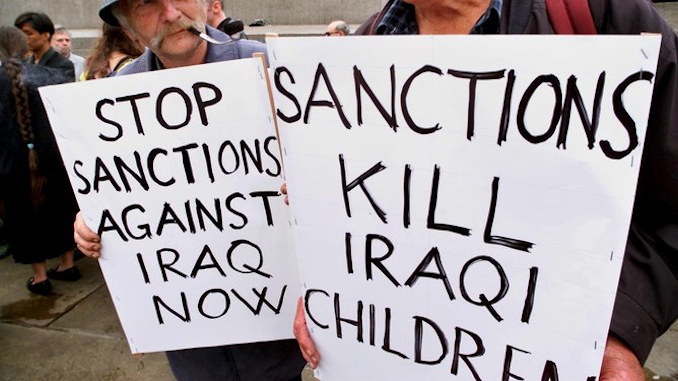
By S.T. Patrick
The White House has announced new sanctions against Cuba due to the response the Cuban government took to stop protests. Joe Biden said Cuba had responded to the protests “with violence and repression, mass detentions, sham trials, and people disappearing who have spoken out.” Biden has made it clear that if Cuba does not align more favorably with U.S. plans for the island, more will come. “There will be more,” Biden said, “unless there’s some drastic change in Cuba, which I don’t anticipate.” Cuba and many others are not new to U.S. sanctions, which can have mixed results and unintended consequences.
Sanctions are increasingly used by presidential administrations to, in the words of Richard N. Haass, writing for the Brookings Institute, “promote the full range of American foreign policy objectives.” Often seen by those who favor them as a peaceful alternative to war, sanctions can have long-term effects on a nation’s people that are both direct and indirect, seen and unseen, physical as well as psychological. Often categorized under the large tent of “economic,” most sanctions levied deal largely in limiting trade, cutting off access to U.S.. bank accounts, regulating the availability of natural resources, denying the purchase of military-style weaponry, and disallowing travel to and from the sanctioned country.
There are problems with sanctions, of course. Depending on what the size, scope, spectrum, and time needed to force an immediate goal, sanctions can often fail in producing their intended result. The U.S. had almost universal support internationally when it attempted to force Saddam Hussein from Kuwait. When he did not leave the oil-rich kingdom, the U.S. engaged in Operation Desert Storm. In examples like this, the skeptical may also wonder whether the sanctions were intended to work from the beginning or whether the desired result was always war. Sanctions failed to drive Fidel Castro from Cuba. They never brought a Shah-like American puppet back to power in Iran. They did not topple Venezuela’s government. They never forced Libya to produce those responsible for the bombing of Pan Am 103. Worst of all, U.S. sanctions are estimated to have killed over a million Iraqis.
Since the onset and subsequent failure of sanctions, the U.S. has engaged in overt and covert military actions in all those nations.
When the U.S. goes about sanctions unilaterally, they often fail only those American businesses who would have profited otherwise. Israel has been the only nation to consistently support the lengthy sanctions against Cuba in the UN. The Castro brothers sought and found other countries to replace the departure of trade and travel from the U.S. Unilateral sanctions can sting a country, but they rarely force it into a desired action.
Sanctions often lead to a war of allegiances with international consequences. When some nations refused to support the U.S. actions against Cuba, Iran, and Libya, the U.S. threatened the third parties with sanctions of their own, thus causing an international issue where one never existed and forcing the World Trade Organization and the United Nations to step in. In some cases, the U.S. can look like the bully enforcer internationally, which then encourages empathy and support for the nation and leaders that are sanctioned.
The unintended consequences can be harsh and destructive. Sanctions have produced a mass exodus from Haiti to the U.S., as well as a reliance on nuclear weapons in Pakistan. When U.S. actions weakened Pakistan’s access to weaponry, the Pakistani leadership put more effort, energy, and funding into building its own nuclear weapons.
Misguided use of sanctions can also lessen democracies and bolster tyrants. When the economic and natural resources become scarce due to sanctions, the leaders of that country hold more power to distribute those scarce resources to supporters and financiers. Access is freedom, after all.
The worst unintended consequences of sanctions are mass starvation and a push of a populace into Third World status. When trade and resources are withheld from a country, those leaders (from democratically elected to tyrannical despot) can gain solidarity and support from their people rather than losing it. If the leader can move the U.S. into the role of the international villain, determined to starve a nation that won’t bend over backward for Uncle Sam’s global demands, then the U.S. is the bad guy in the eyes of the people and not their leader. If the U.S. were successful, it would have no problem breeding contempt for the leader and convincing the people to rise up against that leader. When that does not happen, the U.S. has injured its standing within the country.
To believe the use of sanctions is preferable to war is to believe that the U.S. would not see it as an act of war to cut off its access to Middle Eastern oil, East Asian fruit, Swiss bank accounts, and international travelers vacationing in the States. To cut off the above from the U.S. economy would be hostile acts of aggression to the U.S., a sovereign nation. The question of hypocrisy then arises. Are we sanctioning nations in ways that we would never accept in return?



